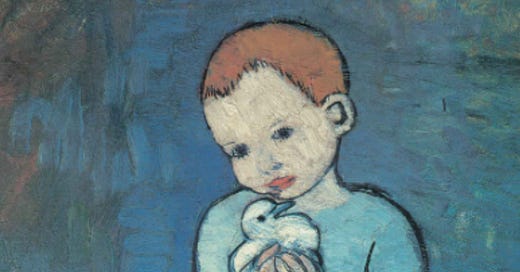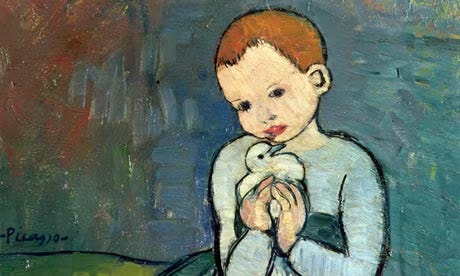Saved Through Childbearing
Personal tragedy, my first childbirth, and how our bodies preach the Gospel
A certain macabre set likes to complain about modern America’s death denial. How we call funerals “celebrations of life” and buy our meat under plastic in pale, glistening slabs. “Bring back mourning!” they cry. “Let’s slaughter our own chickens.” I’m inclined to agree.
But, then, I’m not the one who needs to hear their message. I’m faintly macabre myself, having lived in death’s shadow since age 10 when three family members died in a crash. My seven-year-old brother and I survived. So here are two young Americans, at least, who aren’t in death denial. To us, the susurrations of dried leaves underfoot form words, each Fall, again and again: “Memento mori”—”Remember you will die.”
Until recently, however, I’ve been deaf to another song Americans have trouble hearing—the song of the redbuds each Spring. “Memento nati,” they hum. “Remember you were born.” I didn’t begin to hear it until I became a mother. And, in many ways, it’s saved me.
Motherhood taught me to hope.
When your own body is preaching the Gospel, it’s hard not to believe it.
I often tease my husband about his pessimism. He never expects anything good to happen. This makes sense. He grew up in an emotional war zone where skyscrapers could never be built. I on the other hand, never expect good things to stay. Growing up was more like living post-9/11. The World Trade Centers had soared upward, but one blue and sunny day, they came crashing down. If this could happen, was anything secure? It seemed everything was destined for the grave.
Because of this, as a child, I was poker faced in public, cried a lot in secret, and rarely smiled. I felt like everyone around me was like a bioluminescent algae colony, floating on the ocean, unaware of the darkness and the bonechilling waves. I, on the other hand, was a solitary swimmer, an outsider, an observer, struggling to keep my head above the water as my teeth chattered from the cold. Death was just around the corner.
This sentiment continued into adulthood. When my husband proposed to me, for example, I was convinced one of us would die before the wedding. (Spoiler, neither of us did.) Fast forward three years later to pregnancy—I braced myself for a miscarriage. “Lord, if it’s your will to take this baby, I can bear it.”
How shocking, then, to discover one morning that my body had successfully produced a new life.
During pregnancy, I had waited and waited. I ached. I lumbered. For 24 hours, I quaked with excruciating pain. Again, I thought I would die. Then, exactly when death should have come, instead came life—and life multiplied! The story of pain ended with jubilation.
Perhaps Paul says women are saved through childbirth because when your own body is preaching the Gospel, it’s hard not to believe it. When the baby came, I knew everything would be okay. What this meant, for me, was that Everything—the universe, the cosmos, all of time and space—would be okay. In other words, Jesus was right. Death would be swallowed up by life. My body pantomimed the story of the world and convinced my heart it was true.
To crown it all, I gave birth to a daughter. I didn’t see the significance of this until a mentor exclaimed, “How good God is! You lost your little sister, and he’s given you a little girl.” In this way, my daughter was a small foreshadowing of God’s plan restore all things.
Joy comes from understanding both death and birth.
When I hear of a particularly horrible atrocity, I sometimes still wish God had destroyed everything in the Biblical flood. But then I imagine Noah stepping out of the ark into the ruined world. I think he must have questioned whether he had the courage to start over. And then I think he must have looked at his kids. That’s what keeps me going, too.
My child is the greatest in the kingdom of heaven. I bow before her child-ness, her mochi-soft cheeks, the memory of her yelling face wrinkled from the womb. This is life, and through her, I am born anew each day. Now, awareness of death, instead of deadening me, focuses my life into a keen and brilliant point.
Of course, motherhood brings a host of challenges. I’ve never done something so strenuous. But it’s a fresh kind of strenuous, like pulverizing rosemary in a mortar or pulling weeds. I understand why people complain about colick, sleepless nights, the 24/7 work. But perhaps we exaggerate those struggles because we’ve forgotten about death.
Memento mori, though unhealthy on its own, heightens our sense of the miracle of birth. Only when we’ve seen how precarious life is can we appreciate our task as parents. We are able to witness the infinite “Yes!” of life lifted, as e.e. cummings writes, “from the no of all nothing.”1
Then, like the one newly born, we become all “tasting touching hearing seeing
breathing.”
e.e. cummings concludes his poem:
”(now the ears of my ears awake and
now the eyes of my eyes are opened)”
All I can say is that motherhood did that for me. It restored my innocence without robbing me of wisdom. It reminded me that although I will die, I also was born. And my favorite season is now not Fall, but Spring.
Readers, I’m fed up with the negativity around motherhood because it seems so obvious that (a) mothering is tough work and (b) it’s the best work! The two do not have to be in conflict. Running marathons, for example, is tough and awesome at the same time. No one seems to have a hard time understanding that. Let me know your thoughts in the comments.
This essay/testimony was inspired by:
A conversation with my friend Sarah A. about how a certain celebrity recently said: “All of my friends who have kids are in hell. I actually don’t know anyone who’s like happy and has children at this age [20’s].” Like. Dude. What?
Emily Hancock’s “I Quit Heroin So I Could Breastfeed.” Another in the genre of motherhood’s saving power.
This comment from Lane Scott. It gave me a clue about Paul’s cryptic saying that women are saved through childbearing. Here it is in part:
“Christianity is about dying for another and giving your life for another. Women are biologically hardwired to do this. As such, they have a leg up when it comes to religion. They can of course decide not to serve, but for most women having a child instantly gives them the motivation to die for another person. They will willingly give up their lives and their interests without thought for the sake of their child.”
“i thank You God for most this amazing” by e.e. cummings
i thank You God for most this amazing
day:for the leaping greenly spirits of trees
and a blue true dream of sky; and for everything
which is natural which is infinite which is yes
(i who have died am alive again today,
and this is the sun’s birthday; this is the birth
day of life and of love and wings: and of the gay
great happening illimitably earth)
how should tasting touching hearing seeing
breathing any–lifted from the no
of all nothing–human merely being
doubt unimaginable You?
(now the ears of my ears awake and
now the eyes of my eyes are opened)
e.e. cummings
1894-1962






Incredible writing. "It’s a fresh kind of strenuous, like pulverizing rosemary in a mortar." This line alone captures the life-and-death element that is mothering. Thank you for making this point about remembering death and life together, it rings with truth.
Great article, thank you for writing it. Motherhood is hard work, but has produced so much joy.
Also I'm glad you and your husband both survived! May God give you and your family many years before taking you home.